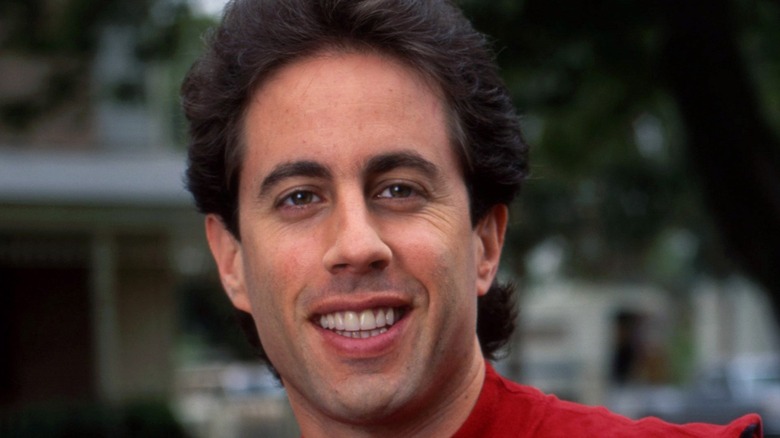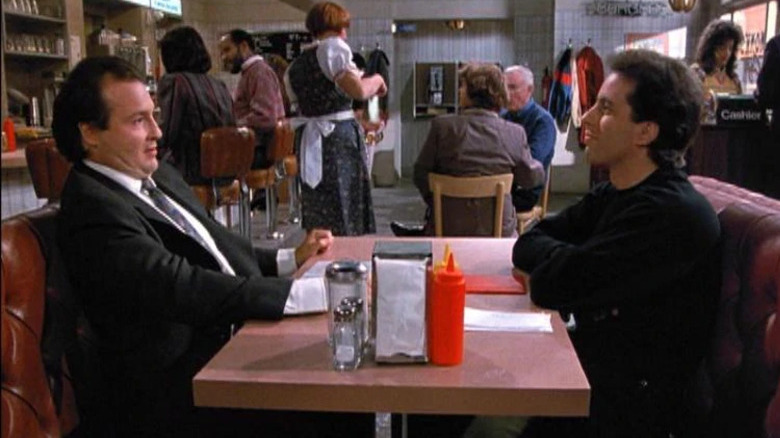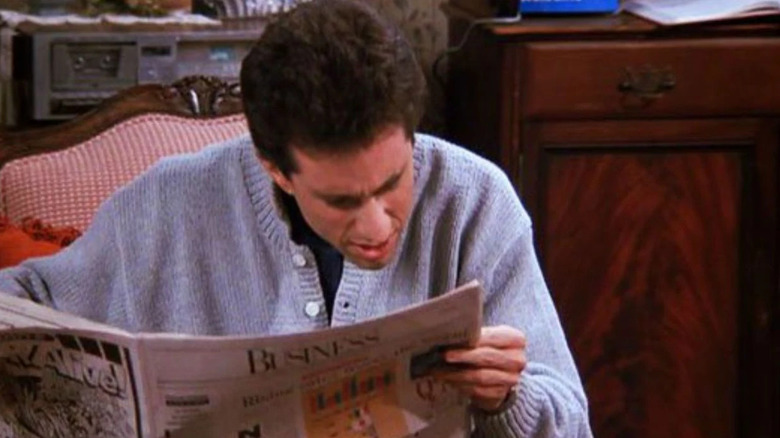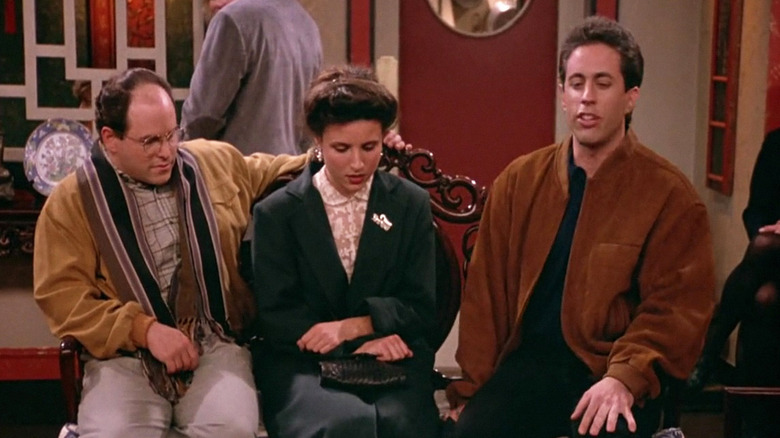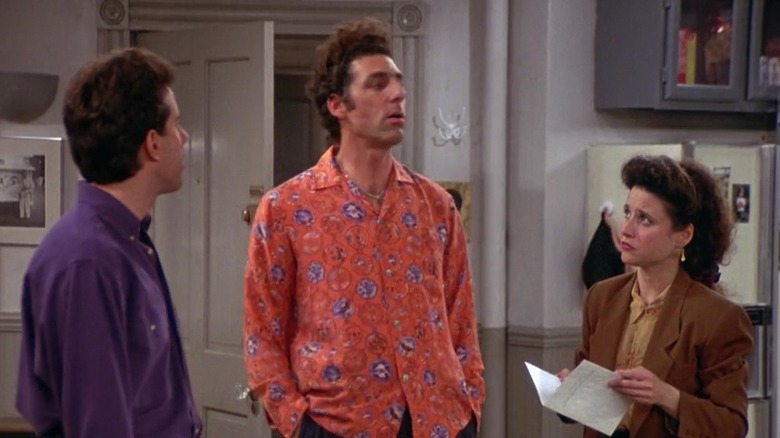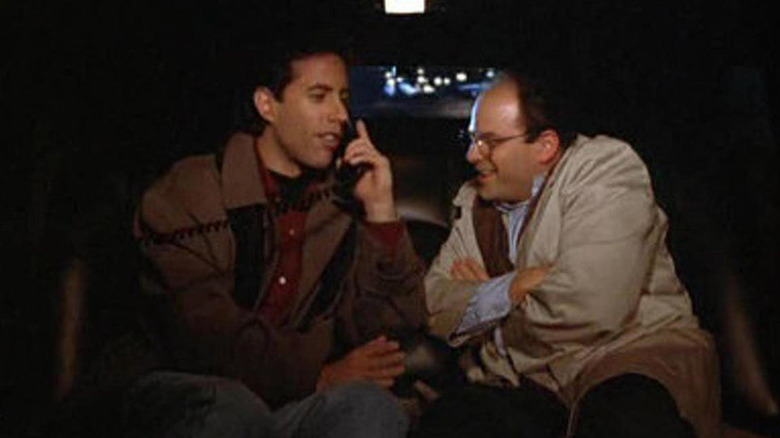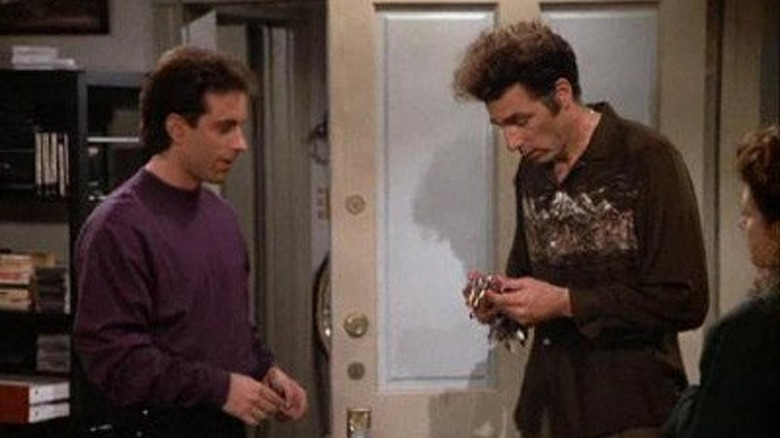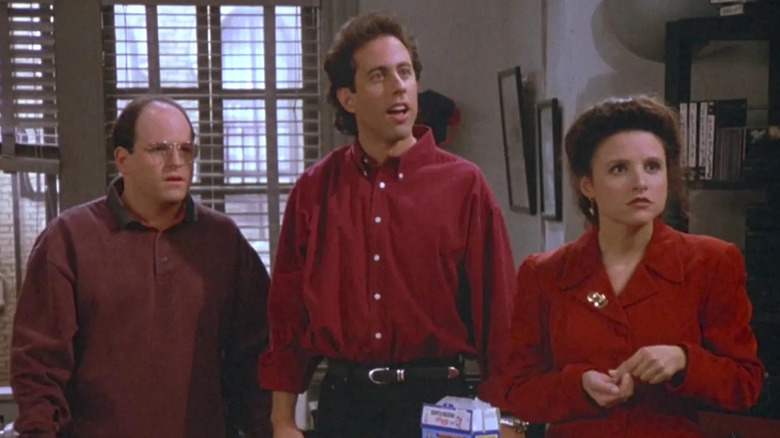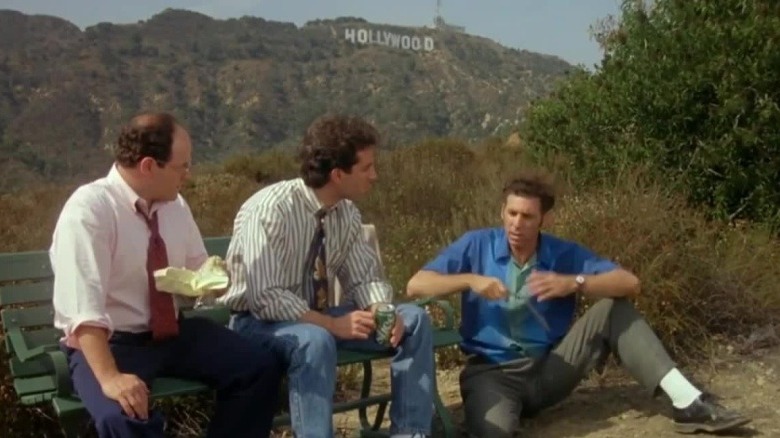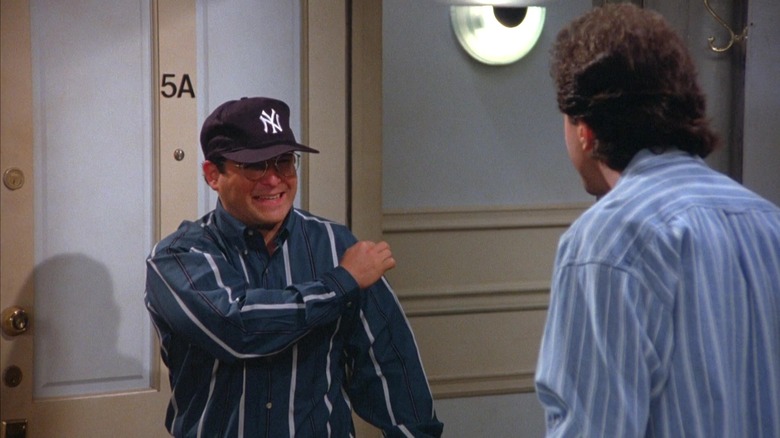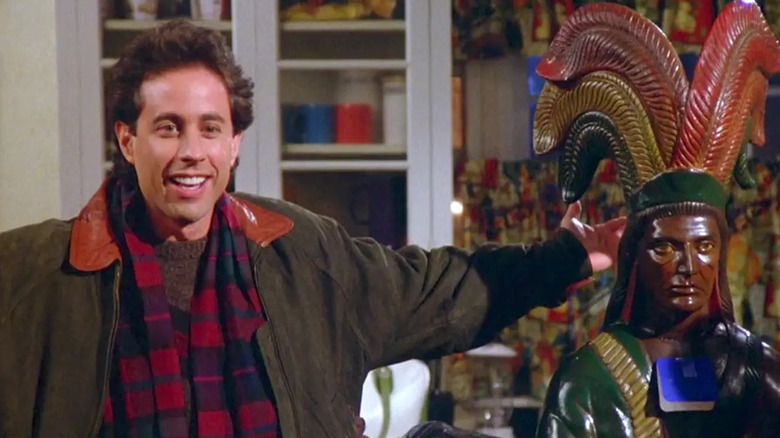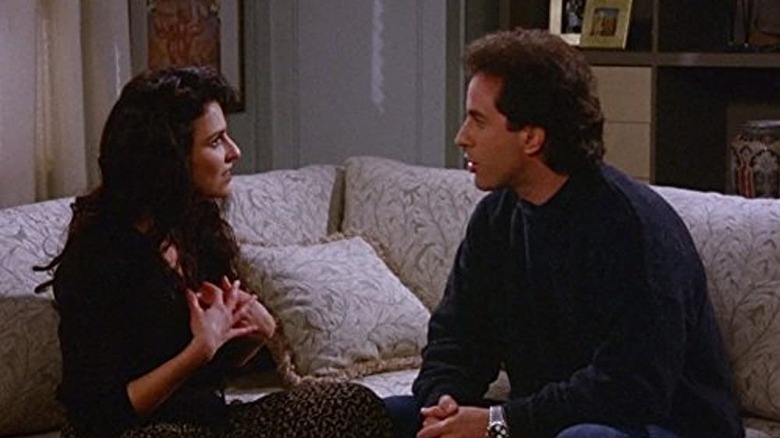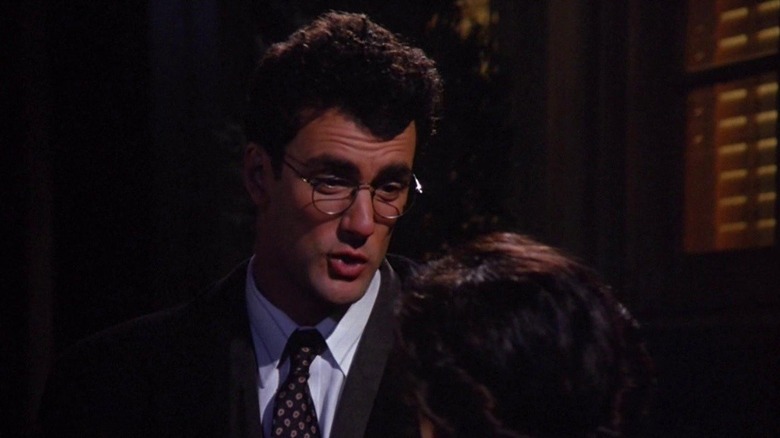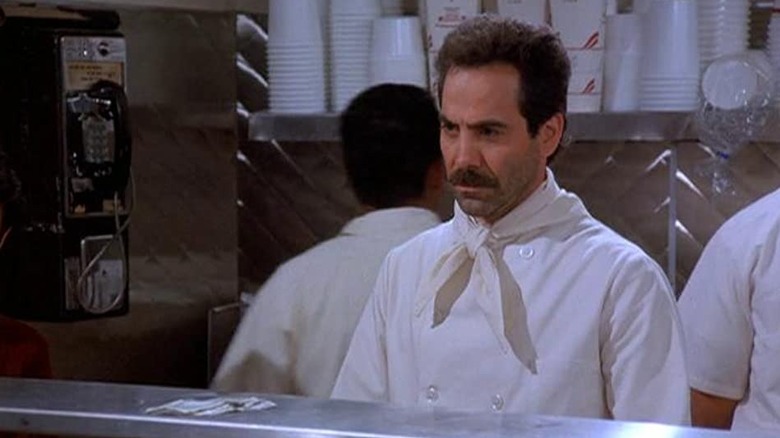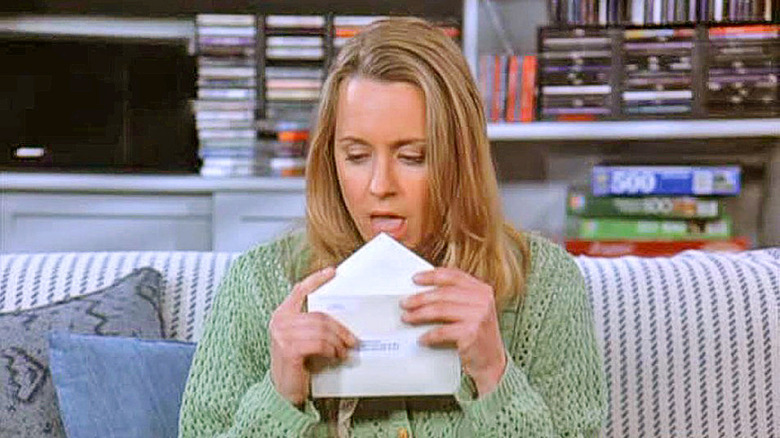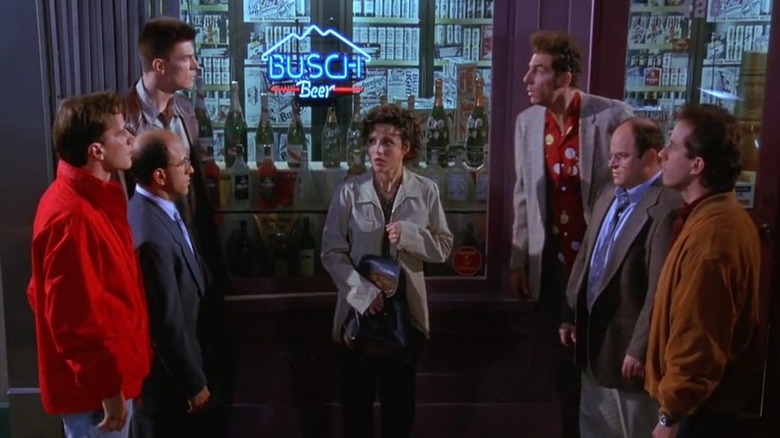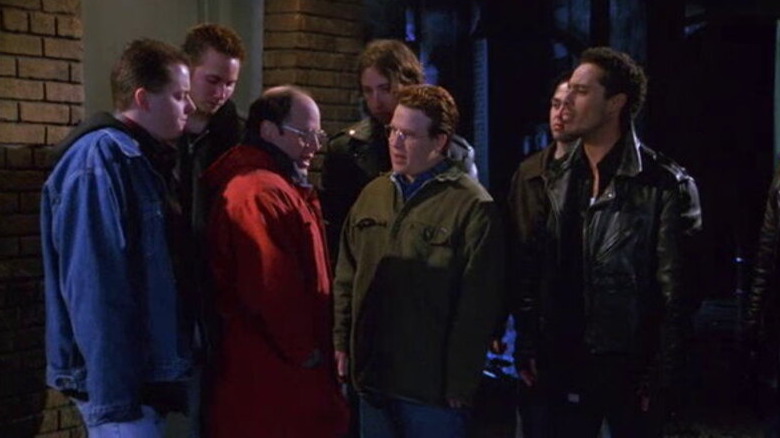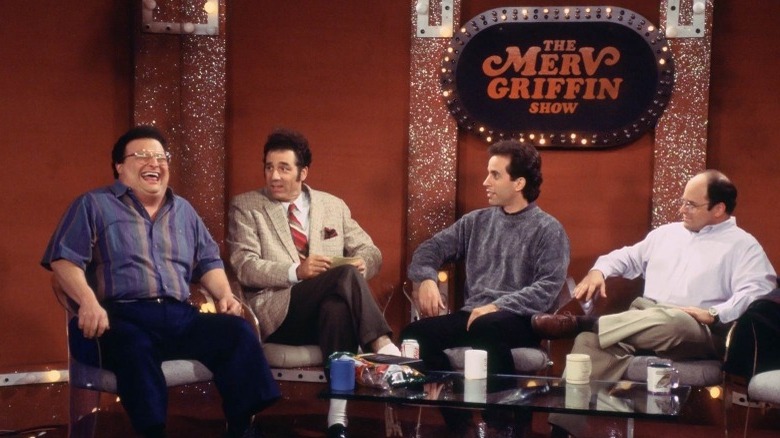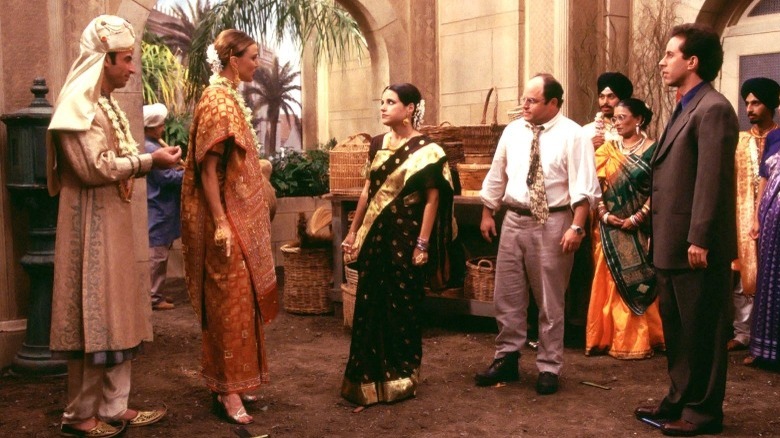The Best And Worst Storyline In Every Seinfeld Season
One of the most enduring and beloved sitcoms of all time is "Seinfeld," created by Jerry Seinfeld and Larry David and running on television for nine seasons from 1989 to 1998. The show Seinfeld as a fictionalized version of himself as he and his friends George (Jason Alexander), Elaine (Julia Louise-Dreyfus), and Kramer (Michael Richards) went about their daily lives in Manhattan. Winner numerous Emmy Awards and one of the most popular sitcoms ever, each season of "Seinfeld" is packed with hilarious and relatable storylines — along with some stories that are considerably more maligned.
For every episode that completely knocks it out of the comedic park, there is at least one episode a season that falls flat on its delivery, with characters making questionable choices and plot lines feeling forced. Here are the best and worst storylines from each of "Seinfeld's" nine seasons and what makes each of them stand out, for better or worse.
Best (Season 1): Jerry tries to break up with a friend
The first season of "Seinfeld" is something of a curiosity within the wider context of the series as the show's winning formula had not quite been established yet. One early episode with a notably funny premise that would help set the course for the show moving forward occurs in the episode "Male Unbonding" as Jerry reunites with a childhood friend named Joel (Kevin Dunn). With Joel insisting on staying in contact with Jerry despite the two having grown apart, Jerry approaches the dissolution of their friendship like he would a romantic breakup.
Jerry's attempts to break things off with Joel escalate into a series of progressively more awkward incidents revolving around Jerry trying to avoid going to a New York Knicks game with his estranged buddy. The storyline gives the rest of the main ensemble their own roles in Jerry's predicament, starting to take advantage of each of their perspectives into Jerry's personal life. While "Male Unbonding" may not hold up to some of the series' later episodes once the show's foundation has been firmly set, it does offer a glimpse at what would make the show so great.
Worst (Season 1): George and Jerry get into stock trading
One of the more unusual storylines in the inaugural "Seinfeld" season has George and Jerry get mixed up in stock trading in the aptly titled episode "The Stock Tip." After one of George's friends sees his stock valuation increase significantly based on a tip, he and Jerry decide to get in on the action with their own sizable investments. This leads to a financial rollercoaster for the two men as they quickly discover just how unpredictable and volatile the stock market can be.
On paper, the idea of Jerry and George trying to become savvy stock market traders seems out of place within the wider context of the show. The types of ventures the main characters pursue have always been noticeably more outlandish than trying to ride the latest financial trends. George, who is particularly known for being a walking professional disaster throughout the series, is operating out of character as someone using conventional get-rich-quick schemes in the episode.
Best (Season 2): Jerry et alia wait for a table at a busy restaurant
As its sophomore season progresses, "Seinfeld" truly finds its own distinct voice. This evolution is apparent in the Season 2 episode "The Chinese Restaurant." Jerry, George, and Elaine try to get a table at a Chinese restaurant before catching a movie only to find themselves caught in a lengthy wait. As the trio grows hungrier, Elaine tries desperately to find a way to get food, while Jerry and George face their own respective distractions in a story that unfolds in real time entirely in the waiting area.
The genius of "The Chinese Restaurant" is its single setting and unconventional plot, relying entirely on the strength of its writing and cast. "Seinfeld" has earned a reputation of being a show about nothing, but the series did have stories; they just happened to be relatable, slice-of-life vignettes largely confined to standalone episodes. Network executives vocally opposed the premise of "The Chinese Restaurant" for its perceived lack of story, but the episode set the template for some of the series' best moments.
Worst (Season 2): Jerry and Elaine become a couple
Though Jerry and Elaine had been a couple prior to the events of the show, the bulk of the series featured the two characters keeping their relationship platonic as close friends. This was changed in the Season 2 episode "The Deal," with the two characters embarking on what was intended to be a purely physical relationship before deciding to develop this into a committed romance. The move was one made to appease network executives, who felt that Jerry and Elaine should become a couple to help appeal to wider audiences.
While Dreyfus and Seinfeld both enjoyed the episode, the development ruins any sexual tension between the two characters, who are better suited with their respective long list of short-lived love interests. This amorous development never advanced beyond "The Deal," with the circumstances behind the end of their romance never discussed on-screen afterward in the series. Within the episode itself, Kramer comments that he liked Jerry and Elaine better when they weren't a couple and the sentiment proved both self-aware and prophetic.
Best (Season 3): George poses as a VIP
While picking up Jerry from the airport in the Season 3 episode "The Limo," George's car breaks down, stranding the two men at the airport. Desperate to get home, George poses as a VIP receiving his own limo into Manhattan, with Jerry supporting the ruse by pretending to be George's assistant. This scheme quickly backfires in both of their faces, when the true nature of the man George is impersonating comes to light and puts the two men on a particularly dangerous car ride.
Many "Seinfeld" episodes feature one of the members of the gang coming up with a plot to get rich quick or circumvent the normal rules of polite society. These plans often go awry from unforeseen complications that escalate to wacky levels. In trying to find a quick way to get home through some light identity theft, George and Jerry get their hilarious comeuppance on the limo ride from hell.
Worst (Season 3): Jerry and Kramer have a falling out
Having Jerry as a next-door neighbor, Kramer constantly takes advantage of his generosity by barging into his apartment unannounced and treating Jerry's home as an extension of his own. Kramer takes this dynamic a step too far in the Season 3 finale "The Keys," prompting Jerry to demand that Kramer return the spare keys to his apartment to prevent any further unsolicited incursions. This results in the biggest estrangement of their friendship seen over the course of the series, culminating in Kramer temporarily leaving New York City altogether by the episode's end.
While having two main characters experience interpersonal drama is perfectly natural on a show and helps both characters grow and reexamine their relationship, this particular disagreement feels forced. What makes that all the more apparent is Kramer's exaggerated response to Jerry reclaiming his own spare keys, even as Jerry attempts to return them in an effort to repair their friendship. An oddly dour note to close out its third season on, "Seinfeld" puts a cliffhanger ending on this storyline that feels a bit hollow.
Best (Season 4): The gang challenges each other to self-celibacy
The shameless core quartet of "Seinfeld" is often frank in sharing intimate details from their personal lives. The gang decides to make things a little more interesting with their sexual proclivities in the Season 4 episode "The Contest," making bets to see who can go the longest without masturbating. This storyline became one of the series' most popular, with references to it made occasionally throughout the show revealing George to be the winner.
Interestingly, given network censorship practices at the time, the term "masturbation" is never used within the episode itself, adding to the comedy with the terminology and innuendo the gang uses instead. The mounting sense of temptation that each of the characters experience makes for some exceptionally funny gags throughout the episode as the contest reaches its climax—pun intended. David would win an Emmy Award for his work writing "The Contest," cementing its reputation as one of the series' best episodes.
Worst (Season 4): Kramer runs off to California to start an acting career
The cliffhanger ending at the end of "Seinfeld" Season 3 saw Jerry and Kramer get into a big argument, resulting in Kramer relocating to California to become an actor. Season 4 picked up this storyline with its two-part premiere "The Trip," chronicling Kramer's transit to California and his activities in Hollywood. Though the change of pace and setting seemed like an interesting detour at first glance, the entire storyline comes off as contrived and ultimately adds little to the series or character.
With enough already going on with Kramer's cross-country odyssey, the story attempts to shoehorn a subplot of Kramer being implicated as a serial killer preying on the citizens of Los Angeles. While "Seinfeld" has had effective episodes set outside of New York City before, "The Trip" feels like an overly long, half-baked adventure outside of its comfort zone. Kramer's inevitable return to Manhattan was a welcome one, underscoring that the character works best as part of an ensemble rather than spend too much time separated from his friends while this story couldn't end fast enough.
Best (Season 5): George flips the script
George quickly established himself as the main group's resident sad sack, drifting through a series of failed jobs and romantic relationships that he often self-sabotages. By the Season 5 finale "The Opposite," George decided to completely change up his approach to life in a desperate effort to reverse his fortunes. Though George's lifestyle changes proved surprisingly successful for him, his rise was juxtaposed by Elaine's own downward spiral as she filled the void as the group's put-upon loser.
George begins consciously making decisions that are completely opposite to those he'd normally make, resulting in him going on a date with a beautiful woman and being hired by the New York Yankees. Elaine, however, endures a breakup and begins to visibly take less care of herself, going as far as to resemble George in his lower moments. Clinching this funny storyline is the realization that while George and Elaine occupy the opposite spectrums of the group's success, Jerry remains smack dab in the middle, with no overwhelming sense of success or failure at all.
Worst (Season 5): Jerry offends Elaine's Native American friend
Jerry and his friends have committed plenty of morally questionable choices over the course of "Seinfeld," sometimes veering headfirst into racial insensitivity. One of the most egregious instances occurred in the Season 5 episode "The Cigar Store Indian" that has Jerry acquire the eponymous object and give it to Elaine. To make matters worse, Elaine's Native American friend Winona (Kimberly Norris) is present and understandably deeply offended by the present and insensitive way Jerry unveils it.
The way Jerry, and later Kramer, use racial humor derisively towards indigenous peoples in this episode feels both out of character and particularly heavy-handed in its delivery. While Jerry has certainly never been a paradigm for respectful race relations, he also possesses a degree of common sense and self-awareness about what jokes not to make. "The Cigar Store Indian" eschews any semblance of that restraint in favor of cheap, unfunny laughs.
Best (Season 6): George advises Jerry on how to swap girlfriends
None of the main characters in "Seinfeld" is particularly lucky in love, with Jerry's complicated love life facing a heightened amount of scrutiny in the Season 6 episode "The Switch." Dating a woman named Sandy (Jann Karam) who doesn't respond to his sense of humor, Jerry finds that Sandy's roommate Laura (Heather Medway) can't help but laugh at all of Jerry's jokes. Faced with this conundrum, Jerry plots for a way to swap out his date for her roommate without alienating both of them and completely squandering the situation.
What makes the central storyline in "The Switch" so effective is that all of the people Jerry turns to for advice, it's the notoriously lovelorn and clueless George. Cunning and calculating, George presents Jerry with a fool-proof scheme to cleanly pull off the swap with a hare-brained approach that is just crazy enough to work. The episode provides a window into just how shamelessly depraved George really is and what lines even Jerry won't cross as he plans to accomplish the seemingly impossible.
Worst (Season 6): Elaine tries to convert a queer man to heterosexuality
As one of the guys, Elaine is just as willing to make ethically dubious decisions, and this is readily apparent in the Season 6 episode "The Beard." The episode has Elaine go on a date with a homosexual man named Robert (Robert Mailhouse) so his true sexuality isn't revealed to his conservative boss. Enjoying the experience, Elaine becomes determined to convert Robert to heterosexuality so she can actually embark on a romantic relationship with him.
"Seinfeld" is a show that made great strides in regards to depicting queer character relationships on-screen, going as far as to win a GLAAD Award for its representative efforts. This distinction is undercut slightly by "The Beard," which has Elaine assume that she can successfully seduce a homosexual man with a tone-deaf conversion scheme. Fortunately, Elaine's plans ultimately fail and paint her as especially ignorant on the matter. Nonetheless, the story feels like a step backward for the show.
Best (Season 7): The gang contends with a gifted but dictatorial chef
The gang has encountered plenty of antagonists in all of the familiar places that Manhattan has to offer, but the most memorable of them all is the Soup Nazi. Starring in his own eponymous episode in Season 7, Yev Kassem (Larry Thomas) opens a successful soup restaurant with some of the best soup in the city. However, Kassem runs his soup counter with an iron fist and with a strictly enforced set of rules, earning him his notorious nickname.
What makes "The Soup Nazi" such an effective episode is that it showcases how each of the main characters interacts with Kassem. While Jerry and Newman (Wayne Knight) keep their heads down and play by the rules to get their soup, George's neuroses cause him to self-sabotage before the discerning chef. Elaine, of course, meets the Soup Nazi at his own level and plots his downfall, giving her the last laugh amidst all the hilarious antics along the way.
Worst (Season 7): Susan dies licking toxic envelopes
Of all the main characters, surprisingly it was George who got the closest to getting married over the course of the series. After striking up a relationship with television executive Susan Ross (Heidi Swedberg) in Season 4, George and Susan held an on-off romance culminating in the couple getting engaged in the Season 7 premiere. This led to tragedy in the lead-up to the wedding, with Susan dying from repeatedly licking toxic glue on the cheap wedding invitation envelopes bought by George in the season finale "The Invitations."
The story was written by David after Alexander, Louis-Dreyfus, and Seinfeld felt they didn't have acting chemistry with Swedberg, leading David to decide to kill off the character. Susan's death was met with a fair amount of controversy after its initial airing in 1996 and continues to divide audiences decades later. "Seinfeld" never went particularly dark with its sense of humor and, in killing off George's fiancée, the story is among the show's more mean-spirited moments.
Best (Season 8): Elaine finds a set of doppelgängers
"Seinfeld" had steadily been making references to the DC Comics flagship superhero Superman ever since its first season and one of the key elements of the Man of Steel's mythos eventually became a narrative focal point. In the Season 8 episode "The Bizarro Jerry," Elaine realizes her latest ex-boyfriend Kevin (Tim DeKay) and his group of friends are doppelgängers and inversions of Jerry, George, and Kramer. Jerry compares the phenomenon to Superman's morally inverted supervillain Bizarro, with Kevin dubbed "Bizarro Jerry" as Elaine spends more time with him and his ensemble.
Eight seasons in, "The Bizarro Jerry" gives the show a chance to poke self-aware fun at itself and its main cast by juxtaposing them against their opposites. The story has the meta-textual sense to wink at the audience based on their expectations of how Jerry and his friends would normally act in contrast to the more thoughtful group led by Kevin. Elaine found a friend group that offered a refreshing change of pace from Jerry but, by the end, she learns which ensemble she truly belongs to after glimpsing what could be.
Worst (Season 8): The group faces a gang inspired by Martin Van Buren
"Seinfeld" is no stranger to outlandish plots, but one that doesn't particularly connect with the audience is a story that features a street gang inspired by the American President Martin Van Buren. In the Season 8 episode "The Van Buren Boys," Kramer and George are separately menaced by the eponymous gang, with Kramer escaping harm because he inadvertently throws up their gang sign. The story is perhaps "Seinfeld" at its most forgettable in its later seasons and a signal that the long-running series may have begun to spin its wheels.
Across the most enduring, entertaining "Seinfeld" antagonists, there is a detectable trace of grounding verisimilitude to them, from the Soup Nazi simply being too strict to Newman's lazy greed. The entire premise of a street gang running around Manhattan looking to keep the legacy of Martin Van Buren alive feels better suited for a completely different show. The Van Buren Boys are quietly shelved after their one-off appearance in Season 8, never to be heard from again, and this move was definitely for the best.
Best (Season 9): Kramer converts his apartment into a talk show set
Kramer's apartment has been used for plenty of bizarre schemes and flights of fancy, from setting up a large hot tub inside to using it as an impromptu Cuban cigar-rolling sweatshop. The final season saw Kramer discover discarded set pieces from the '60s talk show "The Merv Griffin Show" and take them for himself. With Newman as his co-host, Kramer converts his apartment into the set of "The Merv Griffin Show" and pretends to host a facsimile of the show, complete with guests.
The Season 9 episode "The Merv Griffin Show" really does showcase just how eccentric and disconnected from reality Kramer can be. Caught up in his personal fantasy of being a talk show host, Kramer becomes concerned about non-existent ratings and the perceived quality of his guests. One of the best Kramer-centric episodes in the series' entire run and among the best stories in its final season, "The Merv Griffin Show" provides a wacky window into Kramer's hilarious mind.
Worst (Season 9): Elaine takes Jerry and George to her rival's wedding
"Seinfeld" began to experiment with its format more as the series entered its later seasons, with the Season 9 episode "The Betrayal" having its scenes staged in reverse chronological order. The episode's story had Elaine have Jerry and George accompany her to attend her rival Sue Ellen's (Brenda Strong) wedding in India out of spite. Making this already awkward situation even tenser is that Jerry recently slept with someone he set up as a date for George.
The novelty of "The Betrayal" lies within its unique storytelling format and not within the episode's storyline itself, with some odd character moments for Jerry and his friends. From Jerry betraying George to Elaine agreeing to become Sue's maid-of-honor, there are numerous choices that feel out of place and forced. An experimental episode in the final season, "The Betrayal" comes off as a curious attempt to subvert the storytelling formula with a half-baked premise.
